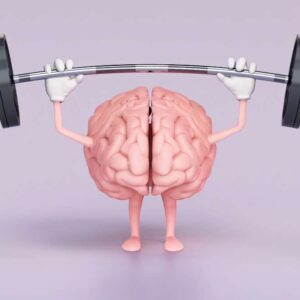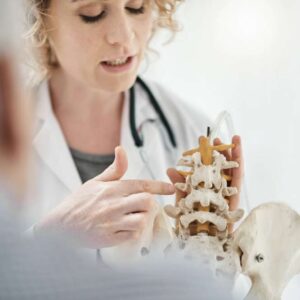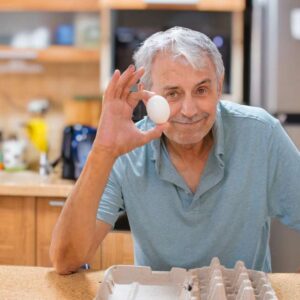
Common Deficiency DOUBLES Risk of Your Body Attacking Itself
Most of us know vitamin D as the “sunshine vitamin.” And many think of it mainly for bone health as we age. But research now suggests that this nutrient may be just as crucial for supporting our immune system throughout life, beginning as early as childhood.
In fact, a lack of vitamin D, especially in younger years, could increase the risk of autoimmune conditions like type 1 diabetes.
This connection highlights the importance of vitamin D not just for our own health, but also as something we can encourage in the younger generations.
Read on to see how this new research can affect not just your health, but that of your children and even grandchildren.
Vitamin D does FAR more than help bones grow strong. It’s an essential nutrient for maintaining immune health.
One way it works is by supporting T cells—a type of white blood cell responsible for identifying and attacking foreign invaders like viruses or bacteria.
When T cells develop properly, they learn to distinguish between the body’s healthy cells and harmful invaders. But in autoimmune diseases, this process goes awry—T cells begin to mistake healthy cells for harmful ones, leading to attacks on the body’s own tissues.
A recent study by researchers at McGill University found that vitamin D deficiency disrupts the development of these “tolerance” mechanisms. The researchers noticed that mice lacking active vitamin D had a smaller thymus, an organ crucial for T cell maturation.
Without enough vitamin D, T cells become more likely to attack healthy tissue, raising the risk of autoimmune reactions.
The researchers also identified a critical gene, known as the autoimmune regulator (Aire) gene. It helps prevent T cells from turning against the body.
Vitamin D plays a role in activating this gene, and without enough vitamin D, the gene’s activity drops, increasing the likelihood of autoimmune responses.
In their study, the researchers observed that mice with low vitamin D levels had higher counts of “self-reactive” T cells, the kind responsible for autoimmune attacks. These findings suggest that vitamin D deficiency not only accelerates thymic aging but also may be a trigger for developing autoimmune diseases, especially when it occurs during the early stages of life.
While this research highlights the importance of vitamin D for children’s immune health, it also reinforces that maintaining healthy vitamin D levels is crucial at any age. Seniors, especially those with limited sun exposure, can benefit from adequate vitamin D to support the immune system and maintain overall wellness.
Sharing these findings with children or grandchildren could encourage lifelong habits that protect immune health—something that becomes more valuable as we age. A simple vitamin D boost might help fortify the entire family’s health, regardless of age.
Since vitamin D deficiency is common, especially in colder climates or for people with limited sun exposure, here are some easy ways to ensure you and your family get enough:
- Seek Out Sunlight: Just 15-20 minutes of sunlight exposure on your skin a few times a week can stimulate vitamin D production. The midday sun is best, though it’s essential to balance exposure with skin protection.
- Try a Supplement: A vitamin D supplement may be helpful, particularly during winter months. Consult with a healthcare provider for a dose suitable to your age and needs.
- Eat Vitamin D-Rich Foods: Foods like salmon, fortified dairy, eggs, and mushrooms are great sources of vitamin D. Adding these to your diet can help maintain healthy levels.
- Get Regular Testing: If you suspect a deficiency, ask your doctor about a blood test. Low levels can often be corrected with targeted supplementation and a diet rich in vitamin D.
The connection between vitamin D and autoimmune health is more than just another health trend—it’s a fundamental discovery that could change how we approach immune health across generations. By taking simple steps to maintain adequate vitamin D levels today, you’re not just protecting yourself; you’re safeguarding your children and grandchildren from serious autoimmune conditions tomorrow.
Here’s what else we’ve covered this week in Living Well Daily…
America’s Next Prescription Epidemic?
A shocking new study reveals that 1 in 4 adults misusing ADHD meds may be at risk for addiction. Discover why it’s happening and what you can do to protect your brain naturally.
Hidden Hormone Drop Puts Your Heart at Risk
As estrogen levels decline during menopause and beyond heart protection decreases. But nature offers a surprising ally—and, oddly enough, you’ll find it in the produce aisle.
“Doomed to Diabetes?” Not with THIS $3 Supplement Solution
A groundbreaking study has uncovered that something gathering dust in the supplement aisle might help keep blood sugar in check by taming inflammation.
Are You “Addicted” to Soda? (It’s NOT Your Fault)
Research reveals the “soda addiction” you sometimes joke about may be very real—but it’s not just be psychological. A shocking new study finds how a “molecular addiction” to soda could be destroying your health.
Mailbag: “Digestive Drama” Strikes MILLIONS Over 50
Ever wonder why your digestion isn’t what it used to be? We’ve got answers (and solutions!) for the digestive drama that comes with aging.
How Your Poop Schedule Predicts Disease Risk
Talking about our bowel movements remains taboo. But the truth is, your poop schedule might be the most important indicator of your overall health.
What is a Healthy Night’s Sleep? Three Critical Criteria
That perfectly uninterrupted eight hours of sleep they keep preaching about? It’s a myth. Here’s what REALLY matters…
P.S. Cracking the vitamin D dosage code. How much SHOULD you take?
Sources:
Patricio Artusa, et al., Skewed epithelial cell differentiation and premature aging of the thymus in the absence of vitamin D signaling, Science Advances, 25 Sep 2024, Vol 10, Issue 39, DOI: 10.1126/sciadv.adm9582
Written By Dr. Scott Olson, ND
Nearly 25 years ago, failed mainstream medical treatments left Dr. Olson in constant pain – and his health in ruins. And that’s when he did something REVOLUTIONARY. He began his career in medicine – and dedicated his life to uncovering the true, underlying causes of disease.
Through his innovative medical practices in Tennessee and Colorado, Dr. Olson has helped cure countless seniors from across America of arthritis… heart disease… diabetes… and even cancer. All without risky prescription drugs or painful surgeries.
View More Free Articles
Get Intermittent Fasting Benefits Without Going Hungry
Intermittent fasting, which involves cycling between eating and fasting periods, is effective. There’s plenty of evidence for that. It’s not just weight loss, either. Intermittent fasting has significant benefits for metabolic health. However, many people find fasting difficult to stick to—and others can’t do it at all due to medical issues—so they miss out on...
Just Diagnosed with Hypertension? —6 Things to Do Next
You’ve been diagnosed with high blood pressure—now what? First, take a breath. You’re not alone—over 30 percent of adults worldwide have hypertension. That makes it one of the most common health issues… and a top cause of preventable deaths. The good news is that, unlike some conditions that can leave you feeling helpless, high blood...
Brain Games Are USELESS—Do These 5 Things Instead
I’ve seen a lot of lists lately claiming to have the secrets that keep your brain from turning into mush as you age. They typically advise activities such as doing crosswords, learning Spanish, or taking up the accordion. Challenging your mind with new learning experiences is definitely a great way to keep your brain engaged...
This $5 Fix REVERSES Cellular Aging in Just 6 Months
You take your vitamins, eat your vegetables, and feel healthy—so your nutrition is covered… right? Well, new research suggests that even health-conscious older adults may be missing crucial nutrients that keep their cells functioning like those of younger people. The trouble is that as we age, our bodies become less efficient at absorbing nutrients from...
Mailbag: Doctors Get Bone Health WRONG—Here's What Really Works
“Thank you so much for answering this. With millions of women who are seniors over 70 facing a diagnosis of osteoporosis, this is my question. What can we do naturally to help improve our bone density, especially in the spine lumber 1 and 2? Also, how do we help improve bone density in the femur...
Critical Brain Nutrient Missing In 9 Out of 10 American Diets
You’ve probably heard plenty about brain-boosting omega-3s, antioxidants, and B vitamins. But there’s another nutrient that’s just as critical for your cognitive health. However, it’s been flying under the radar… until now. Mounting evidence suggests this overlooked compound could be key to protecting your brain and enhancing memory. It may even reduce your risk of...
"Miracle Berry" Supercharges Your Microbiome
Happy Father’s Day to all the dads and granddads who’ve shared their wisdom, strength, and love through the years. Thank you for teaching us that the best medicine is laughter, love, and a father’s caring heart. Want to upgrade your health but don’t want complicated diets or expensive supplements? Science just revealed a delicious way...
This "Healthy" Sweetener is Sabotaging Your Weight Loss
Everyone knows that a balanced diet and regular exercise are crucial for maintaining a healthy weight. But what if the “diet” products you’re using to cut calories make you hungrier, so you eat more? Well, a shocking new study suggests that a popular artificial sweetener is secretly sabotaging your weight loss efforts. Let’s dig into...
“Banned in Europe” Food Additive Triggers Hormone Chaos
If you’ve ever enjoyed the bright white frosting on a cookie or vibrantly colored candy, you’ve likely consumed titanium dioxide. This common food additive, used to make products look more appealing, is now at the center of a growing health debate. Titanium dioxide is essentially makeup for food—a white powder that enhances colors and makes...
Your Phone Is DESTROYING Your Brain—Here's How to Fight Back
Ever notice how—after a day of bouncing between your phone, computer, and TV—your brain feels like it’s been stuffed with cotton? You may struggle to remember what you need at the store, fumble for words, or stare blankly at your crossword puzzle. It’s not because you’re getting older—it’s what your devices are doing to your...









